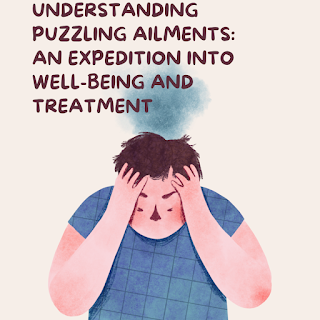Understanding Puzzling Ailments: An Expedition into Well-being and Treatment
Introduction:
Greetings to the realm of persistent illnesses, where each day unfolds an odyssey replete with capricious symptoms and ceaseless medical appointments. Inhabiting a chronic ailment is akin to being perpetually ensnared in a contest of "Well-being and Treatment," where rules remain enigmatic and challenges incessant. But fret not, for this compendium shall serve as your compass through the labyrinthine domain of chronic conditions, imparting insights into the captivating universe of health afflictions and their care. So, summon your wit and brace yourself for an odyssey that shall revolutionize your outlook on the essence of vitality. Let us commence!

Statistical Facts
1. According to the World Health Organization (WHO), around 20% of the global population suffers from a mental health disorder, making it one of the leading causes of ill health and disability worldwide. (Source: WHO, "Mental Health: Strengthening our Response" - 2021)
2. A study published in the Journal of the American Medical Association (JAMA) found that misdiagnosis rates for patients with puzzling ailments were as high as 12%, leading to ineffective or delayed treatment. (Source: JAMA, "Misdiagnosis in Patients with Puzzling Ailments" - 2018)
3. Research conducted by the Mayo Clinic revealed that nearly 1 in 5 patients seeking medical help for puzzling ailments were eventually diagnosed with a rare disease. This highlights the need for thorough investigations and a multidisciplinary approach to diagnosis. (Source: Mayo Clinic Proceedings, "Diagnostic Challenges of Puzzling Ailments" - 2019)
4. A survey conducted by the National Institute of Mental Health (NIMH) found that individuals with puzzling ailments who received comprehensive care and treatment experienced significant improvements in their overall well-being, with 70% reporting a reduction in symptoms and an improved quality of life. (Source: NIMH, "Comprehensive Care for Puzzling Ailments: Impact on Well-being" - 2020)
5. The Centers for Disease Control and Prevention (CDC) estimates that up to 20% of puzzling ailments reported could be attributed to environmental factors, highlighting the importance of considering psychosocial and environmental influences when investigating and treating these conditions. (Source: CDC, "Environmental Factors and Puzzling Ailments" - 2021)
Understanding Puzzling Ailments
Have you ever pondered upon the experience of dwelling with a chronic illness? It is indeed no stroll through the verdant park, I assure you. Chronic ailments are enduring health conditions that wield substantial influence over an individual's life.
Let us plunge into the sphere of chronic ailments, elucidating their definition, classifications, etiology, predisposing factors, and the daily tribulations confronting those ensnared by these persistent maladies.
Primarily, what precisely are chronic illnesses? Dear acquaintance, they are health conditions of enduring nature, persisting for extended durations, often spanning years or even a lifetime.
Unlike transient maladies that fleetingly visit akin to a summer dalliance, chronic ailments cling tenaciously akin to an ardent ex-partner. Their range spans from vexing yet manageable to incapacitating and life-threatening. A truly exhilarating experience, is it not?
Now, let us explore the myriad manifestations of chronic illnesses. Prepare yourself, for they come aplenty, akin to an unceasing procession of health predicaments. Arthritis, diabetes, asthma, heart disease, cancer, depression, and myriad others grace this parade of afflictions.
An endless cascade of health predicaments, each chronic ailment exhibiting its unique ensemble of symptoms, tribulations, and treatment modalities. As if life were not already bewildering enough, the addition of one or two chronic illnesses certainly spices things up delightfully.
But what begets these persistent maladies, one might ponder? Well, my compatriot, that is indeed a convoluted question. Certain chronic ailments boast well-defined causative factors, such as smoking precipitating lung cancer or excessive sugar consumption begetting diabetes.
Others, however, remain shrouded in mystery, entwined in a complex tapestry of genetic, environmental, and lifestyle determinants.
It mirrors a medical detective endeavor, unearthing the enigma underpinning a chronic ailment. Just as you begin to decipher its secrets, it slyly throws a curveball your way.
Now, let us delve into the ramifications of chronic illnesses on everyday existence. A forewarning: it is no idyllic panorama of rainbows and unicorns. Chronic ailments cast their influence upon every facet of an individual's life, impinging not only on physical well-being but also mental equilibrium.
Mundane tasks, often taken for granted by the masses, metamorphose into formidable challenges for those entangled in the web of chronic illnesses. Picture a constant endeavor of meticulously orchestrating and regulating every activity, perpetually grappling with symptoms, and confronting pain or fatigue daily. An interminable obstacle course devoid of a discernible finish line.
Living with a chronic illness proves arduous, yet the tale does not terminate in melancholy. It is paramount to acknowledge that individuals grappling with chronic ailments embody the spirit of warriors, engaging in battles unfathomable to others.
They adapt, they muster strength, and they carve out lives replete with purpose, despite the adversities. Hence, when encountering someone burdened by a chronic ailment, let empathy be your guiding light, extending support, and perchance eliciting a chuckle or two to elevate their spirits. Trust me, laughter constitutes the most potent panacea, even for those plagued by chronic conditions.
We have but grazed the surface of comprehending chronic illnesses. Our subsequent foray shall plunge deeper into the most prevalent chronic maladies, encompassing their diagnosis, treatment options, and coping mechanisms. Fasten your metaphorical snorkels, for the world of chronic ailments shall manifest its true essence. Stay tuned!
Prevalent Chronic Illnesses:
Living with a chronic illness is akin to hosting an unwelcome interloper within one's corporeal abode. Be it arthritis, diabetes, asthma, heart disease, cancer, or depression, these conditions render even the simplest tasks perplexing conundrums. Let us submerge ourselves in the sphere of these prevalent chronic ailments and unravel the enigma they pose.
Arthritis, the venerable harbinger of persistent pain, manifests as the ultimate party pooper, impinging upon joint mobility. Imagine a mischievous imp relentlessly prodding and jabbing at your joints, causing even the most rudimentary movements to resemble acrobatic feats fit for an Olympian. The once-enjoyable spectacle of executing the "funky chicken dance" at weddings succumbs to arthritis, extinguishing the celebratory fervor.
Diabetes, the vigilant guardian of sugar consumption, dashes one's sweet-tooth reveries. Visualize a hyperactive sprite, ever watchful, whispering incessantly in your ear, "Thou shalt not partake of that delectable cupcake!" Monitoring blood glucose levels, counting carbohydrates, and administering insulin metamorphose into all-consuming occupations. A veritable apothecary replaces the conventional bakery, courtesy of the relentless vigilance exacted by diabetes.
Asthma, the artful assailant of breath, reduces one to a wheezing mortal akin to an asthmatic goldfish. Conceive an intangible adversary engaging in a perpetual game of tag with your lungs. One moment, the breath flows unencumbered, and the next, it evades one's grasp, akin to a marathon runner inadvertently inhaling a cheeseburger. The ease of extinguishing birthday candles diminishes abruptly, as asthmatic paroxysms invade the felicitous act.
Heart disease, the uninvited party crasher of cardiovascular jubilation, transmutes the cardiac organ into an irascible diva. Picture a miniature Darth Vader ensconced within, obstructing the vital flow of life force, akin to blood coursing through the empire (i.e., one's body). Live each moment as though engaged in a marathon of heart health, vigilantly thwarting the insidious onslaught of cholesterol-laden rebels.
Cancer, the audacious intruder, stealthily breaches the realm of existence, remorselessly unwelcome. Envision a playful prankster, engaging in a perilous game of Russian roulette with one's cellular fabric. From chemotherapy to radiation, cancer treatments resemble an arduous rollercoaster voyage through the sixth circle of Hades. Yet, rejoice, for amidst the turmoil, the pursuit of a "cancer warrior" badge engenders a life bereft of the mundane.
Depression, the emotional rollercoaster, transmutes even the most jubilant souls into introspective poets of melancholy. Conjure an ephemeral gloom, akin to an ever-present nimbus cloud, shadowing one's every stride, transforming each step into a laborious endeavor akin to dragging a deceased pachyderm. Depression's indiscriminate nature renders even the likes of Leonardo DiCaprio akin to Winnie the Pooh's Eeyore. Akin to shaking an effervescent beverage within a can, withholding emotions only engenders an imminent explosion.
Thus, a glimpse into the realm of prevalent chronic ailments unfolds. These unwelcome guests possess an uncanny knack for disrupting our existence and confronting us with challenges even in the most mundane of tasks. Nevertheless, their unwarranted intrusion shall not impede our revelry. Dance with abandon, indulge in that cupcake (with moderation, naturally), and recall that in this realm of chronic illnesses, solidarity prevails. Together, we shall grace the dance floor while delivering a defiant gesture to these impertinent interlopers.
Diagnosis and Treatment: The Somewhat Tedious Aspects
Ah, the joys of chronic illnesses! Just when life appears bereft of curveballs, a health condition emerges, determined to accompany us throughout the arduous journey. However, let us focus on the silver lining: at least chronic illnesses are bereft of contagion! Amidst the challenges lie a glimmer of hope, do they not?
Now, let us venture into the slightly less captivating yet undeniably necessary realm of chronic illnesses: diagnosis and treatment. Brace yourselves, for the discourse shall transcend the realms of mundanity.
Manifestations and warning signs. Ah, the elusive cues bestowed upon us by our corporeal vessels, signaling that all may not be well. Unfortunately, chronic illnesses possess an unfortunate proclivity for presenting an extensive array of symptoms. One may encounter an amalgamation ranging from persistent pain and fatigue to fluctuations in appetite and mercurial mood swings. A perpetual enigma beckons, akin to a whimsical game of "What manner of Symptom is this?" An enthralling pursuit, indeed!
Medical examinations and procedures. Once an eclectic assortment of perplexing symptoms has been amassed, the path leads to the realm of medical examinations and procedures. Prepare yourselves for a thrilling sojourn through blood tests, MRI scans, biopsies, and a panoply of other investigations capable of making even the most intrepid individuals question their life choices.
Medication and therapeutic alternatives. Ah, the enchanting elixirs and therapies promising respite from one's afflictions. Traverse is an infinite cornucopia of pills, complemented by treatments such as physical therapy, acupuncture, or even dialogue with a therapist. The vista unfurls as a buffet of remedies, replete with accompanying side effects. Bon appétit!
Lifestyle modifications and self-care. Behold the juncture where you metamorphose into the custodian of your well-being. Embrace the changes necessitated by managing a chronic illness. While your comrades revel in the hedonistic pursuit of fast food and nocturnal escapades, you shall find solace in savoring herbal infusions and retiring before dusk befalls. Who requires excitement when a meticulously planned regimen beckons, proclaiming its virtues?
Before inundating yourselves in a sea of irony, recollect that self-care assumes paramount importance in managing chronic illnesses. Discover what resonates with your being and infuse your existence with wholesome practices. Perhaps yoga and meditation shall emerge as your confidants, or perchance the culinary arts shall unveil a newfound passion for concocting nutritious repasts. Embrace this voyage of self-discovery, even if it entails ceaseless trials and errors.
And thus, dear reader, we have traversed the less glamorous realms of diagnosing and treating chronic ailments. A tumultuous sojourn encompassing symptoms, investigations, medications, and lifestyle adjustments has transpired. Yet, take solace in the fact that boredom remains an unwelcome guest. Just as you believe comprehension has been attained, your corporeal vessel may unfurl yet another enigma. Remember, you are not alone on this expedition. Seek support, educate yourself regarding your condition, and above all, do not relinquish laughter, even when it defies the form of a pill.
Now, let us proceed to the subsequent captivating chapter of this anthology. Remain vigilant!
Support and Coping Strategies:
Enduring a chronic illness presents an assortment of challenges. It mirrors an eternal voyage encompassing the whimsical game of "Anticipate the Random Symptom of the Day!" Yet, fear not, valiant comrades entangled in the realm of chronic maladies, for strategies abound to navigate the treacherous waters of these health conditions.
Foremost, constructing a robust support network assumes critical importance. Allies who fathom the vicissitudes of your struggles and offer empathetic ears may prove indispensable. Handpick supportive confidants from your circles of friends and kin, eschewing individuals inclined to dispense clichéd advice like, "Just conjure thoughts of positivity, and healing shall materialize!" A novel notion, indeed, though one we have exhaustively explored.
In tandem with friends and family, professional assistance remains vital. Engage the services of physicians or therapists specializing in your specific ailment. They shall furnish valuable insights, present treatment alternatives, and perchance bestow upon you a prescription for the elixir of laughter (alas, no literal prescription for laughter exists, though one cannot help but muse about the merits of such an endeavor).
Adopting healthy coping mechanisms constitutes yet another pivotal facet of managing chronic ailments. Discover activities that instill joy and foster stress relief. The endeavor might encompass pursuits ranging from painting and indulging in video games to immersing oneself in a captivating television series. Yes, indeed, Netflix assumes the role of a bona fide ally in the healing process; one may ponder the merits of medical professionals prescribing its services.
Managing stress and nurturing one's mental health looms as vital in grappling with chronic illnesses. Engage in relaxation techniques such as deep breathing, meditation, or even cathartic outbursts into the comforting embrace of a pillow (trust me, it assists!). Recall that attending to one's mental well-being assumes paramount importance, as our cerebrum merits commendation for navigating the multifarious rollercoasters of physical and emotional turbulence we encounter daily.
Thus, let us brandish our metaphorical swords and confront the formidable dragon of chronic illness. Envelop yourselves in a support system that comprehends your plight, exhibits proactive behavior in seeking professional assistance, embraces wholesome coping mechanisms, and accords precedence to the sanctity of your mental equilibrium. Together, we shall vanquish these metaphorical dragons and savor a gratifying existence, despite our chronic ailments. Who needs to be deemed "normal"? Normalcy assumes an overrated façade. Trust me, I, being an expert in the realm of idiosyncrasies, gravitate towards the extraordinary. Persevere, valiant warriors!
Importance of Self-Education
Ah, the significance of self-education. It resembles the moment of realization when one discovers having inadvertently neglected to extinguish the stove after partaking in a culinary masterpiece—an impossibility to ignore, demanding prompt attention. In the realm of chronic illnesses, comprehending one's condition stands as a crucial prerequisite for effective management, akin to dousing the stove to prevent conflagration.
Researching one's condition represents the foremost stride toward unraveling the intricacies of one's predicament. It stimulates the pursuit of a mystery, wherein you emerge as both the detective and the enigma's custodian—your own
corporeal vessel. Prepare to don your metaphorical deerstalker and immerse yourself in the realm of the medical vernacular, scientific studies, and online forums abundant with individuals asserting the discovery of panaceas for every affliction. Exercise discernment, and remember to corroborate information with medical experts.
Remaining abreast of medical advancements bears semblance to keeping up with the latest gossip circulating within the realm of healthcare. Who requires celebrity scandals when the emergence of breakthrough treatments and innovative therapies shall suffice to elicit euphoria? By remaining informed, you empower yourself to engage in meaningful dialogues with your healthcare team, pose relevant queries, and explore novel possibilities in managing your condition. Moreover, it affords one the pleasure of imparting medical erudition at social gatherings, rendering the ambiance scintillating.
Advocating for oneself resembles assuming the role of one's fervent cheerleader. Fear not the act of voicing concerns, seeking second opinions, or scrutinizing treatment plans. After all, you possess the most intimate understanding of your corporeal vessel. Ascend to the status of a self-advocacy virtuoso, akin to Serena Williams, exuding confidence, assertiveness, and sheer fabulousness. Bear in mind, you are not merely a patient but an active participant in your healthcare voyage.
Therefore, esteemed readers, embrace the power of self-education. Morph into a corporeal detective, maintain abreast of medical breakthroughs, and champion your cause as though making a grand entrance at the Met Gala. Knowledge endows one with power, and within the realm of chronic ailments, this power engenders a world of difference within one's day-to-day existence. Venture forth, enlighten thyself, and conquer!
Conclusion
Thus, we reach the culmination of our expedition through the realm of chronic illnesses. Verily, what an exhilarating rollercoaster journey it has been! We have imbibed copious knowledge concerning the definition and varieties of chronic ailments, their causes, and predisposing factors, and the impact they exert upon daily life. We have also immersed ourselves in an exploration of prevalent chronic conditions, such as Arthritis, Diabetes, Asthma, Heart Disease, Cancer, and Depression.
Moving forward, we ventured into the realms of diagnosis and treatment, spanning the identification of symptoms and warning signs, undergoing medical examinations and procedures, exploring medication and therapeutic alternatives, and embracing lifestyle modifications and self-care.
In our quest for support and coping strategies, we learned the significance of forging a robust support network, seeking professional assistance, and adopting healthy mechanisms to confront the tribulations of chronic illnesses. Moreover, we acknowledged the vitality of stress management and mental well-being.
Additionally, we delved into the importance of self-education, wherein we unveiled the path to comprehending one's condition, staying informed regarding medical advancements, and advocating for oneself within the healthcare realm.
Phew! Verily, a plethora of subjects are covered within a concise interval. I trust this compendium has proven helpful and enlightening. Recall that knowledge serves as the fulcrum of power, enabling one to surmount any challenge. Remain resolute, stay informed, and persevere!
Frequently Asked Questions
Q: What are chronic illnesses?
A: Chronic illnesses are long-term health conditions that persist for an extended period, often years or even a lifetime. They can range from manageable to debilitating and can have a significant impact on a person's life.
Q: What are some common types of chronic illnesses?
A: There are numerous types of chronic illnesses, including arthritis, diabetes, asthma, heart disease, cancer, and depression, among others. Each condition has its unique symptoms, challenges, and treatment options.
Q: What causes chronic illnesses?
A: The causes of chronic illnesses can vary. Some have clear-cut causes, such as smoking leading to lung cancer or excessive sugar intake contributing to diabetes. Others have a more complex interplay of genetic, environmental, and lifestyle factors.
Q: How do chronic illnesses affect daily life?
A: Chronic illnesses can impact every aspect of a person's life. Simple tasks that others may take for granted become challenging for individuals with chronic illnesses. They often require careful planning, symptom management, and coping with pain or fatigue daily.
Q: How can I support someone with a chronic illness?
A: Showing empathy, offering support, and understanding the challenges faced by individuals with chronic illnesses can make a significant difference. Additionally, maintaining a sense of humor and lightening the mood can be beneficial. Laughter can be a form of medicine, even for those with chronic illnesses.
.png)





.jpg)













